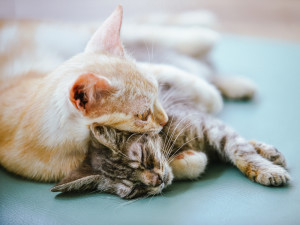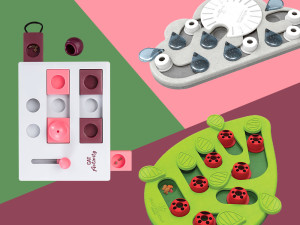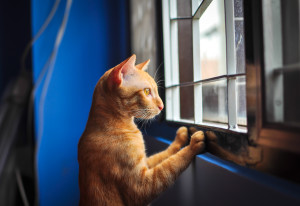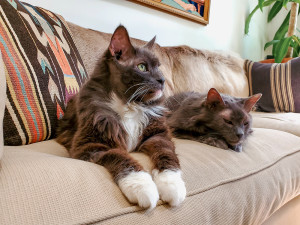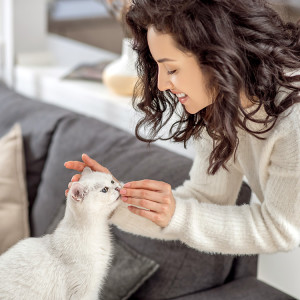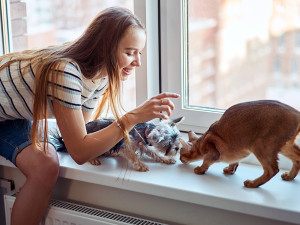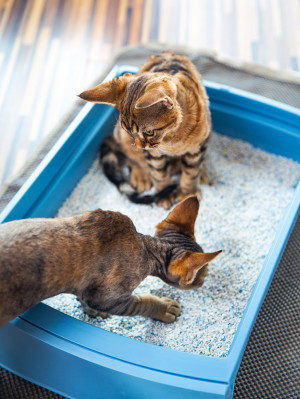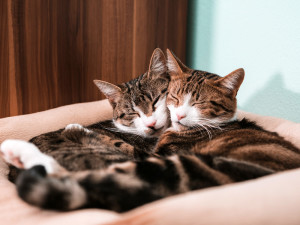What to Know Before Checking Your Cat into a Cattery
Prepare your kitty for their staycation

share article
Forget worrying which outfits to pack, frantically weighing and re-weighing your case, and fine-tuning your itinerary – figuring out what to do with your cat when you go away trumps all the pre-holiday stresses. Should you ask a neighbour or friend to pop in and feed them? Should you arrange a cat-sitter from Cat in a Flatopens in a new tab? Or is your trip short enough that you could leave them to fend for themselves for a day or two with an automatic feederopens in a new tab? For the ultimate peace of mind, many cat parents opt to check their cat into a cattery, where they can rest assured their cat is supervised and safe for the duration of their stay (although we can’t promise the heartache won’t be just as strong when you’re separated from your feline friend.)
Can I trust a cattery to look after my cat?
In 2018, the Department for Environment, Food and Rural Affairs (Defra) introduced stringent new welfare regulations and licensing boundaries for catteries, with licences only granted for three years before enforced renewals, and with surprise visits by the local authorities during that time to ensure that cat welfare is upheld by the licenser holder. These regulations include rules around the amount of space a cat has to roam and sleep in, its waste removal and the cattery’s cleanliness, which are all enforced by each cattery’s local authority in line with Defra’s guidelines. Much like the Food Hygiene Ratings star system you see at restaurants, these cattery regulations come with an ‘Animals Activity Star Rating System’, with five stars coming in as the equivalent of 100% compliant.
However, some catteries choose to interpret the regulations in different ways. For instance, the Feline At Home Cat Hotelopens in a new tab explains on their website that they’ve opted to settle for three stars instead of five, because they didn’t want to comply with the rule that ‘sneeze windows’ between pens should be opaque. “In my experience, the cats like to see each other and interact with each other,” they explain online. So catteries can be ‘each to their own’ to some extent and this will be reflected in their rating.
What can I expect from a cattery?
Prices can range from £14 per day for one cat up to £45 per day at a more luxury lodging, but irrelevant of the cost, all catteries will need to have adhered to the following as a minimum standard in order to receive their licence – and you can check these things when you pay them a visit (which we recommend doing before checking your cat in).
A copy of their licence: make sure this is clearly displayed so you can be sure the cattery has been checked and rated.
No more than 25 cats per one member of staff: the staff that care for the cats should either hold a formal qualification, such as a Level 2 Qualifications and Examinations Regulation (Ofqual), or failing this they would have had to prove to a local authority inspector that they have relevant and sufficient knowledge and experience.
Safe and secure enclosures: there are lots of guidelines here, but in general, the enclosures should be escape-proof, waterproof, secure and free from hazards. And the units must open on to secure corridors or other secure areas so that cats cannot escapeopens in a new tab from the premises (we all know how Houdini-like cats can be when they want to).
Comfortable temperaturesopens in a new tab and lighting: Defra states that “the insulation and temperature must keep some part of the sleeping area between 15C and 26C. The temperature must never go below 10C”, and the cat enclosures should be ventilated but free from draughts. Lights will also be turned off overnight to provide a period of darkness.
Cleanliness and care: cats will be provided with litteropens in a new tab, and their enclosures will be cleaned once a day, with disinfected bedding provided for each new guest.
Enough to go around: if you have multiple cats (cats will never be housed with others unless they come from the same household), their resources – foodopens in a new tab, water, toysopens in a new tab, litter boxes, resting and sleeping areas – will be equal to or more than the number of cats.
A watchful eye: staff have to check on cats every three hours at a minimum, and out of hours (6pm–8am) they should also be checked in-person or by CCTV.
Food and veterinary care: cats have to be fed at least twice a day (food and water will be kept away from the litter box) at least eight hours apart, and you can give the cattery any special food your cat may need for health reasons. If your cat doesn’t eat for 48 hours then a vet will be brought in to assess them.
Enrichment: all cats should have access to toys, scratching posts and hiding spots.
There’s lots more guidelines you can check out, and many catteries will offer more than these basic necessities, giving you options for just how spoilt you want your cat to be while you’re away.
How luxurious are we talking?
The Grove Cat Hotelopens in a new tab in Staffordshire, for example, offers life-sized living rooms for their feline guests, with fires to snooze in front of, ceiling-high stacked cat treesopens in a new tab, beds, tables and even clocks for the more punctual feline resident. “At the start, we had a cattery designer come over,” says Lynsey Randall, owner of The Grove Cat Hotel. “They designed something for us but it looked the same as everyone else’s. We wanted to build it like you would your own home,” she says. “We wanted to feel comfortable because we’re in those rooms for a long time, sitting and playing with the cats. It’s nicer than my home. I’ve used the best wallpaper in the cat’s suites!”
But does cost equal happiness, and will your cat love you more if you opt for a cattery with this level of luxury? “All catteries are very different,” says Lynsey. “I wouldn’t want to be down on any cattery because I know how hard we all work. I guess it depends on what your budget is. But if the cats feel more homely, with music playing, cat TV on, and enrichments with things like the bird feeders, then they do relax quite well.”
Will my cat be distressed at a cattery?
“Some cats will hide away for a day or two and don’t want to eatopens in a new tab, but after a few days they settle down. But it does depend on the individual cat,” explains the owner of a cattery in Essex. “The more they’re spoilt at home, the more they can misbehave,” they say. “Scratches are a hazard of the job, but you get a feel for if a cat wants to be left alone because it will display tendencies that it’s going to go for you! In that case you have to let it find its own way.”
So, although the tight regulations around licensing ensure your cat will be comfortable and cared for, predicting whether your finicky feline is going to enjoy their stay is a different story. “Running a cattery is a way of life,” says Lynsey. “It’s not a business. It’s everyday life for us. I’d be lost if I didn’t have the cats to see every day and cuddle.”
How do I prepare my cat for a stay at a cattery?
Although there is no way to prepare your cat emotionally, there are a few checkboxes you need to tick beforehand, and a few things to be aware of.
Ensure that all your cat’s vaccinationsopens in a new tab and boosters are up to date. The cattery must see your cat’s cat flu vaccination pass before it is allowed entry into the cattery.
Don’t leave it to the last minute. Catteries can be fully booked a year in advance – two of the catteries we spoke to were already fully booked up to 11 months in advance for the forthcoming summer and holiday seasons.
Catteries insist on worm, fleaopens in a new tab and tick treatment prescribed by a vet (and ideally administered by them, too) rather than over the counter.
Let them know about any health issues your cat may have, particularly cat flu. Even though your cat may have recovered and be perfectly well, they can still carry the disease and the cattery may wish to take extra disinfection precautions as a result.
Bring something from home – a blanket, a bed or favourite toys help them settle in.
Any kittensopens in a new tab younger than four months old should not be left on their own for longer than four hours at a time. As some catteries are unmanned during the night, this should be taken into consideration when deciding whether to hand over your little one.
You may be asked for a non-refundable deposit and for pre-determined pick-up and drop-off times.
There can be a minimum stay period, eg two nights, and over the Christmas period this can increase to a seven-night stay. If you decide to collect your cat earlier than planned then you will probably still be charged the full boarding fee amount. Make sure you know what is expected of you in case of those last minute changes to travel plans.
Ask for a tour of the cattery to check the standards for yourself. The design of the sleeping areas and runs will differ in each cattery – and it is perfectly acceptable (and advisable) for you to ask to see all of the accommodation before you hand your cat over, no matter what the budget.

Fanny Johnstone
Fanny Johnstone is a lifestyle journalist for national broadsheets and magazines, a copywriter and painter. She lives on remote Cornish cliffs with her family. In between occasional escapes to London, and worrying about how to save wildlife, she is also manager of the family’s dog and cat partnership, soon to be appearing as The Foxy & Pussca Show.
Related articles
![Two senior cats laying on a couch]() opens in a new tab
opens in a new tabWhy Senior Cats Make the Best Roommates
I adopted a couple of seniors because cats, like wine, only get better with age
![two bonded kittens snuggling]() opens in a new tab
opens in a new tabWhy You Should Adopt a ‘Less Adoptable’ Cat
Here’s why bonded kitties, senior cats and felines with FIV make just as amazing pets as any other
![Woman giving her white cat a vitamin.]() opens in a new tab
opens in a new tabDoes My Cat Need Supplements?
Time to take kitty on a Holland & Barrett spree? Maybe
![Woman playing with her cat and dog.]() opens in a new tab
opens in a new tabHave a Cat But Want a Dog, Too? Here’s How to Make It Work
Just a few things to keep in mind so everything goes smoothly as you all get adjusted
![two cats sharing litter box]()
Can Cats Share a Litter Box?
The better question is should they?
![Two tabby cats in embrace lying in cushion.]() opens in a new tab
opens in a new tabWhat Are Cat Pheromones and How Do They Work?
Communication is key, and pheromones are your cat’s version of DMs
